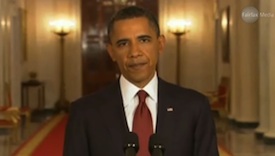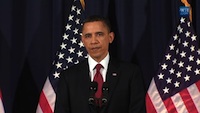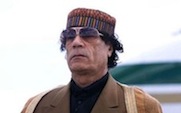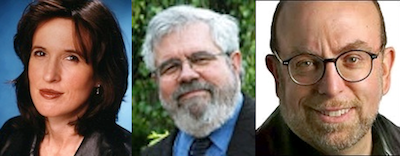Triumph & Tragedy


President Obama announcing the Death of Osama Bin Laden; The Terrorist in his prime
Above the Fold
There are plenty of reasons to rejoice over the death of Osama Bin Laden, including the sense of closure his killing should bring to the relatives of all the victims of his heinous attacks.
But one of the most important reasons isn’t being mentioned much at all: the commando raid on Bin Laden’s compound in Pakistan is the first truly effective response the United States has managed since the terrorist launched his horrific assault against us almost ten years ago.
The tragedy of the deaths of thousands of civilians in those four airplanes, and in the three buildings they crashed into, was fearfully compounded by George Bush’s response to it.
Instead of staying with a limited operation in Afghanistan–and an all-out effort to hunt down the man responsible for 9/11–the president and his neocons used these events to play perfectly into the hands of the man who perpetrated them.
George Bush did that by launching a huge, completely unnecessary war in Iraq, where we are still bogged down almost a decade later, a war which killed and maimed thousands of Americans and hundreds of thousands of Iraquis–and has left that country still barely governable today. It also did as much as anything else to bankrupt the Federal treasury.
Instead of bringing Bin-Laden to his knees, for a very long time the war in Iraq had exactly the opposite effect. As the indispensable Juan Cole pointed out today,“aside from the sheer scale of destruction in Iraq set off by Bush’s illegal and ill-considered adventurism,” the worst thing about this war was the way it “clearly gave al-Qaeda an opening to grow and expand and recruit. I think if Bush had gone after Bin Laden as single-mindedly as Obama has, he would have gotten him, and could have rolled up al-Qaeda in 2002 or 2003. Instead, Bush’s occupation of a major Arab Muslim country kept a hornet’s nest buzzing against the US, Britain and other allies.”
And as my Hillman colleague Hendrik Hertzberg blogged today, yesterday’s raid “underlines one of the many weaknesses of the ‘war’ metaphor and mentality that was immediately adopted in the wake of the 9/11 terrorist attacks: the simplistic notion that the key to defeating Al Qaeda was the military conquest and occupation of territory. Not for the first time, that notion has been exposed as tragically misleading.”
One of Bin Laden’s principal goals was to rid Saudi Arabia of American troops, and less than two years after the attacks on the World Trade Center and the Pentagon, all but 220 of some 5,000 American soldiers had been withdrawn from the Saudi kingdom. His other mission was to do everything he could to weaken the United States–and by giving the fools in the Bush Administration the pretext they had been praying for to invade Iraq, Bin Laden succeeded beyond his wildest dreams.
There is something else important that we can all be grateful for today. By the time Bin Laden was finally hunted down, the extraordinary events of the Arab spring had made it clearer than ever that his ideas have already been relegated to the dustbin of history. Again, Juan Cole explains:
Bin Laden was a violent product of the Cold War and the Age of Dictators in the Greater Middle East. He passed from the scene at a time when the dictators are falling or trying to avoid falling in the wake of a startling set of largely peaceful mass movements demanding greater democracy and greater social equity. Bin Laden dismissed parliamentary democracy, for which so many Tunisians and Egyptians yearn, as a man-made and fallible system of government, and advocated a return to the medieval Muslim caliphate (a combination of pope and emperor) instead. Only a tiny fringe of Muslims wants such a theocratic dictatorship. The masses who rose up this spring mainly spoke of “nation,” the “people,” “liberty” and “democracy,” all keywords toward which Bin Laden was utterly dismissive. The notorious terrorist turned to techniques of fear-mongering and mass murder to attain his goals in the belief that these methods were the only means by which the Secret Police States of the greater Middle East could be overturned.
As Dr. Wahid Abd-al-Majid, an adviser at the Al-Ahram Center for Political Studies, explained to al-Arabiya a couple of weeks ago, Bin Laden’s number two man, Ayman al-Zawahiri “dreamt of being the one who topples President Husni Mubarak, only for the president to be toppled by the youth in a peaceful and democratic revolution that has absolutely no connection to Al-Qa’ida’s long-held claims.”
Finally, yesterday’s success will give pause to Barack Obama’s critics, who have long berated him for his supposed incompetence in foreign affairs. The splendid outcome of this daring raid fulfilled a specific promise that candidate Obama made during the presidential campaign in 2007. Because of it, Obama is probably more powerfu today than he has been at any other time since he entered the White House. And the notion that any of the Republican dwarfs now toying with a run for the presidency might offer him a serious challenge seems even more farcical than it did before.
-30-








